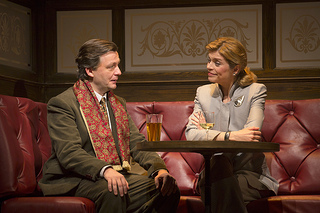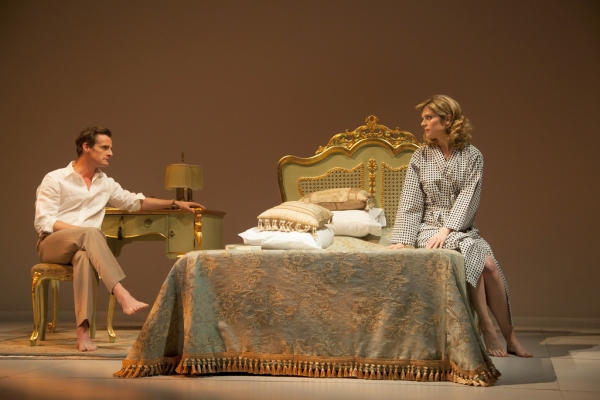Theater Review: A Magnificent “Betrayal”
The Huntington Theatre Company is hosting an exemplary revival of Harold Pinter’s fascinating 1978 work, thanks to the spot-on direction of Maria Aitken.
Betrayal by Harold Pinter. Directed by Maria Aitken. Staged by the Huntington Theatre Company. At the BU Theater, Boston, MA, through December 9.
By Iris Fanger.

Alan Cox (Jerry) and Gretchen Egolf (Emma) in the Huntington Theatre Company production of BETRAYAL. Photo: T. Charles Erickson
Jerry loves Emma, the wife of Robert, who is Jerry’s best friend. That sentence pretty much sums up the formulaic plot of British playwright Harold Pinter’s 1978 tragicomedy, Betrayal,, except for the triple whammy of emotions the minimalist script generates. Arguably the most accessible and human characters in the Pinter canon, this trio of wounded yet smug upper class figures deal with the knotty complexities of illicit love, terror, and guilt. Regret for the carnage, however, is apparently not an option.
In addition to his customarily sparse (and iconic) language of omission, Pinter ups the theatrical ante in Betrayal by reversing the calendar, opening the narrative two years after Jerry and Emma have stopped seeing each other. The play then reels backward by way of various telling encounters over the seven year span of the relationship.
The Huntington Theatre Company is hosting an exemplary revival of this fascinating work, thanks to the spot-on direction of Maria Aitken, the company’s favored British import, and a cast that understands the importance of finding ways to express their feelings by means other than the spoken word. The evening is only 75 minutes long (there is no intermission), so the cast hasn’t a moment to waste in dramatizing the pain the characters inflict upon one another, often in the careless belief that there is no price to pay when it comes to tying to make momentary happiness last,
Alan Cox portrays Jerry as a somewhat clueless “master of the universe,” a writer’s agent with a gift for discovering new talent. He revels in the attentions of a beautiful mistress without budging an inch beyond his comfortable existence. Mark H. Dold turns Robert into a sardonic, upper class roué, masking his emotional reactions beneath a cynical demeanor. The glowing Gretchen Egolf finds surprising depth in the character of Emma, suggesting the joys and sorrows of a woman who thinks she needs a man—or two—to find completion.
Pinter, who admitted to his biographer that his own infidelities to his first wife, the actress, Vivian Merchant, sparked the creation of Betrayal, is acutely aware of how men and women betray themselves (and their shortcomings) in accidental ways. Jerry’s quick, negative response to Emma’s wondering if he’d ever change his mode of living and Robert’s dismissal of Emma’s wish to watch the men play squash and then join them for lunch are clues to how neatly these people have compartmentalized her needs and their loves.

Mark H. Dold (Robert) and Gretchen Egolf (Emma) in the Huntington Theatre Company production of BETRAYAL. Photo: T. Charles Erickson
But let’s not put Emma beyond blame for the domestic failure. The betrayals pile one upon another: Emma betrays Robert; Robert betrays Jerry by not letting on that he has discovered the couple’s affair, keeping his knowledge a secret for four more years. Emma waits four years before she tells her lover that she has admitted her behavior to her husband. One might well ask what kind of woman stays with her husband and continues the affair after he has found her out? And how can one explain that their marriage remains intact, never mind Jerry’s record of cheating on his own wife (whom we never meet). It’s to the credit of these actors that we like (or are at least intrigued by) these characters throughout the production. Nor do we censure their behavior.
The geography of the affair is as significant as its chronology. The play starts off in a pub and then ricochets to the flat where Emma and Jerry play out their housekeeping, moves to Emma and Robert’s swank, modern home, the hotel room in Venice where the affair is found out, and then swerves to the restaurant a few days later when Robert and Jerry meet for lunch, the latter not knowing his cover has been blown. That precise sense of location is marvelously deconstructed in the visual coup de théâtre that closes this revival with a psychic bang. I don’t know whether the idea was suggested by Pinter’s script, devised by Aitken, or dreamed up by set designer Allen Moyer, but I suspect the final image will resonate in my memory for a long time to come.
